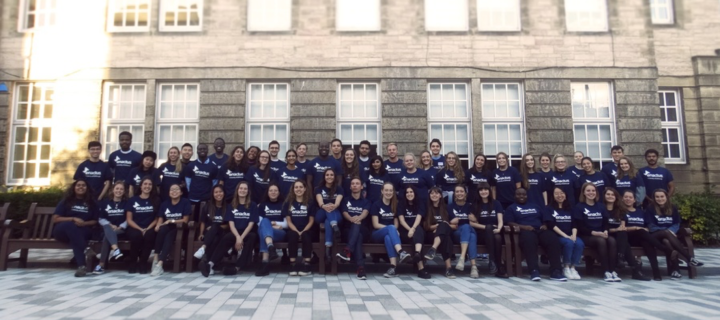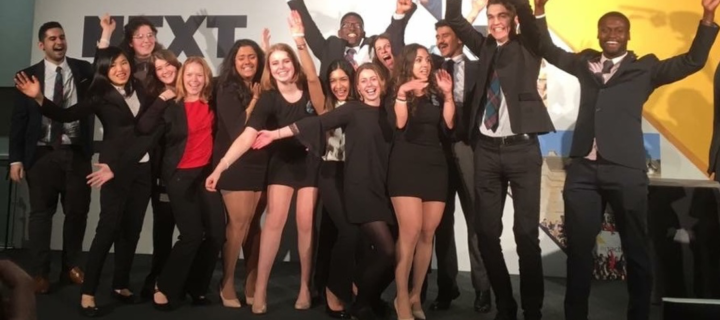Enactus Edinburgh in World Cup Final
The University’s Enactus team will be representing the UK at the world’s largest social entrepreneurship competition in October, the Enactus World Cup.
The competition
The University’s Enactus team recently won the national group of the competition, giving the students a chance to represent the UK at the international stage in San Jose, California. Enactus Edinburgh were crowned the winners of the UK round of the competition after facing 31 other universities.
Judged by a panel of 80 senior business leaders, the team had less than 20 minutes to present three of Enactus Edinburgh’s latest projects - Aiding Change, Lilypads and Sanitree.
The teams were judged on how successfully they had applied business concepts and entrepreneurial approaches to help improve the quality of life for those in need.
Kobby Thomas and Ellie Patey, Co-presidents of Enactus Edinburgh said:
To win the competition made us feel like all our passion and dedication had been recognised and we were thrilled to be crowned national champions.
Looking forward to the World Cup, Alison Wood, founder of Lilypads said:
The World Cup is a fantastic opportunity to be able to showcase our Edinburgh projects to Enactus teams globally and represent the UK. We're all still amazed that were off to Silicon Valley but with World Cup two months away, the excitement has begun to build.
The Projects
Aiding Change trains people in Accra, Ghana to sell affordable solar powered hearing aids to those with hearing impairments.
Kathryn Barnes, project leader of Aiding Change said:
We train local entrepreneurs in sales, marketing and accounting and provide them with a microfinance loan enabling them to set up their own micro-enterprise. The money generated from selling the hearing aids, to low-income individuals in their community, is used to provide the entrepreneur with an income whilst also refunding the initial loan.

In Ghana only 1% of the hearing impaired can afford to buy hearing aids however by eliminating the need for disposable batteries Aiding Change’s hearing aids are five times cheaper than alternatives.
The project is already changing lives. 20-year-old George Marbell dropped out of school after being bullied by his peers due to being unable to communicate because of his hearing impairment. With the help of his new solar powered hearing aid, George is now learning to speak and will soon be returning to school.
Looking to the future, Kathryn hopes that the project can be expanded to include other areas:
The project is currently based in Accra, Ghana. However, we are also currently looking to expand to the Northern region of Ghana. Eventually we hope that we may be able to continue the project in additional developing countries and to train entrepreneurs that are actually hearing impaired themselves.
Period poverty and stigma around menstruation occurs around the world, and two of Enactus Edinburgh’s enterprises aim to tackle this on an international scale. Sanitree aims to help women in India and Lilypads help women in Kenya. Due to the stigma around periods and the cost of sanitary products many women in these areas have to resort to unhygienic methods such as using leaves and rags as an alternative to pads. Both of the initiatives have created reusable pads and education workshops on menstrual health and hygiene.
The beneficiaries of Sanitree now have a secure source of income and flexible working hours as seamstresses manufacturing the reusable pads. The long-term aim of the project is to make the co-operative completely self-sufficient with the team hoping to offer the beneficiaries training in marketing skills, English lessons and opportunities to run their own workshops on menstrual hygiene.
The idea for the Lilypads project came from founder Alison Wood’s dissertation research on effectively teaching sexual health as a charity in Kenya. During her research she found that 25% of people in the Homa Bay region were HIV positive and was this rising more quickly in teenage girls than boys.
In one of the classes that Alison was teaching she asked why the teenagers would choose to engage in sex. Alison explained that:
One of the students who was about 14 years old said poverty. Most secondary schools in Kenya are full boarding, and girls have little awareness of what their periods are when they first arrive. When asking older peers what to do, they are advised to meet older men in the village and exchange sex with them for sanitary pads. She then asked what other option did she have to enable her to remain in school?
After taking the problem of unaffordable sanitary products to Enactus, the team were able to help her develop by her idea, find a team to work on the project and recommend where to obtain funding for the project.
The Lilypads project has allowed the beneficiaries to pay for their children’s school fees and increase their standards of living. The students have reported that the classes have helped them feel more body confident, increased their knowledge of menstruation and understand the risks of transactional sex and how to avoid it.
Alison said:
Currently, we have empowered 12 women through increased income, enabled 270 young women to remain in education with a safe and affordable method for managing their period and ensured 1,400 schoolgirls understand their period.”
How Enactus benefits students

Enactus Edinburgh gives students the chance to make an impact on the lives of others on a local and international scale.
The social enterprise enables students to discover first-hand what is involved in the creation and running of a business. Ellie Patey said:
I think Enactus serves a multitude of purposes for our student members. For some, it is a chance to network with business leaders and sponsor companies and gain valuable business experience, while for others it is a chance to use entrepreneurial action to improve the lives of others, and to do something worthwhile at university.
Kobby agrees that it feels good to be able to make a positive impact on the community adding:
I have learned so much from my past year in Enactus, skills which I didn’t even know that I could learn at university. I have learned how to manage projects and people and how to prepare a pitch for a multinational company.
It also gives students the opportunity to connect with other like-minded people from around the University that they may not have had the chance to meet otherwise. Ellie said:
As an English Literature student, I spend a lot of time studying alone. Joining Enactus made me feel like a part of the university that I otherwise had very little contact with (outside of my own friends) and helped me to meet like-minded students from a range of backgrounds and disciplines.
Reflecting on the personal development aspects of Enactus, Alison said:
The personal development of being part of Enactus is incredible, Mhairi who is part of the Lilypads team presented at Nationals, the final was in front of approximately 1,000 people. Before this she had never spoken in front of a large audience, and yet she was coached and supported to prepare her for the day. I think the trophy we brought home was a testament of what a great job she did!
Successful enterprises making a difference
In the last academic year alone, the 83 Enactus members at the University have helped nearly 5,000 people.
Enactus encourages students to use entrepreneurial approaches to tackle ongoing social issues. Kobby said:
I believe Enactus is so importance because it’s ethos is; if you don’t like something, ‘act’. In the age of social media, viral videos of social and environmental injustices are so prevalent and can leave people feeling helpless, however Enactus encourages entrepreneurial action to solve these issues.
There are several other projects that are part of Enactus. Helping to combat homelessness in Edinburgh, Slurp enables young people who are homeless or at risk to gain valuable work experience by running a soup stall. The money earned from the stall then allows the beneficiaries to pursue a qualification or employment. The project has worked with five beneficiaries over the last two years, with four moving into stable accommodation and employment.
Edinburgh Candle Company helps long term unemployed women back into work. The project teaches the women how to make candles which are then sold through the Enactus website and at local fairs. As part of this initiative women are able to learn business skills and have the chance to take part in CV writing and interview training workshops.
Internationally, Enactus Edinburgh runs Palma Soap which has so far taught 13 women in Malawi who were previously unemployed to make, package and sell a mosquito repelling soap. With a high risk of Malaria, the soap not only helps the beneficiaries but the local community too.

